Cerner Corporation
Simplifying Healthcare Around the World
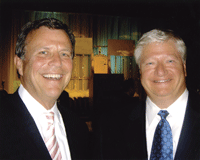 Neil Patterson and Cliff Illig of Cerner Corporation.
Neil Patterson and Cliff Illig of Cerner Corporation. With even a cursory glance at the 27-year history of Cerner Corporation, it’s obvious that this is one company that has it all together. That makes sense, given the fact that “All Together” is the company tagline.
How together is all together? Consider these facts since the company went public 20 years ago:
- A $10,000 investment then would be worth more than $460,000 now.
- Market capitalization is approximately 80 times larger, growing from $45 million to more than $3.5 billion today.
- Revenue has increased an average of 25 percent annually, from $17 million to more than $1.1 billion in 2005.
Although the company has significantly changed since Neal Patterson, Cliff Illig and Paul Gorup brainstormed what would become Cerner around a picnic table in Loose Park, the company’s mission hasn’t: “to connect the appropriate people, resources and knowledge at the appropriate time and location to achieve the optimal health outcome.”
That mission carries through to Cerner’s community involvement. Through the First Hand Foundation®, the company focuses its giving on pediatric healthcare, assisting individual children who have clinical, health-related needs and no financial safety net to cover medical expenses. The First Hand Foundation collaborated with the UMKC School of Dentistry to develop the Partnership for Smiles, a program aimed at improving access to oral healthcare for indigent children in the greater Kansas City region. Since the foundation’s origin in 1995, it has provided nearly $5 million in grants and helped more than 21,000 children, according to company estimates.
Given that Cerner operates in the tumultuous realm of healthcare, creativity, flexibility and quick-thinking are hallmarks of the company’s success. And with almost daily changes throughout the world of politics, science and information technology that directly affect the healthcare industry, the ability to innovate will continue to be a vital sign of Cerner’s ongoing health.
Euronet Worldwide
On Top of the World
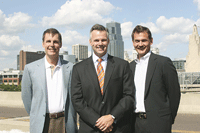 Mike Brown, Dan Henry and Rick Weller of Euronet Worldwide.
Mike Brown, Dan Henry and Rick Weller of Euronet Worldwide. The road to global economic stability travels through Kansas City’s Euronet Worldwide.
OK. That’s an exaggeration. But just a slight one.
In corporate-speak, Euronet is a global leader providing secure electronic financial transaction solutions. In reality, Euronet helps people in emerging and developing markets shift from stuffing cash in their mattresses to depositing money in their nation’s banking system. The company processes an average of 60 million transactions each month and serves customers in 80 countries. It operates the largest independent pan-European ATM network and the largest shared ATM network in India; overall, it has more than 7,200 ATMs operating in 14 countries. Euronet was the first to provide end-to-end ATM outsourcing services in China, the world’s largest market. And it’s the leading provider of electronically distributed service or “top-up” services, for prepaid mobile airtime.
By sowing global economic access, the company has consistently reaped financial rewards. Revenues were more than $531 million in 2005, compared with $61 million in 2001. Since starting as a $4 million venture, Euronet now enjoys market capitalization of more than $1 billion. Mike Brown, chairman and CEO and Dan Henry, president and COO, saw Hungary and Central Europe as prime markets when starting 12 years ago. It didn’t take long for those primary markets to become a worldwide market, as they expanded in Europe, Africa, Asia, Latin America and the Middle East.
That global focus includes raising money and matching employee contributions dollar for dollar for specific projects, mainly worldwide disaster relief efforts. Now with nearly 1,000 employees representing 50 nationalities in 19 countries, Euronet has started a company-wide “Day of Caring.” Each country or team selected its own day and its own local project. The projects ranged from equipping a 90-child orphanage with computers and Internet access in Budapest to improving a facility for homeless people in Sydney.
Employees say projects help them connect at a local, as well as a global, level, suggesting it really is a small world, at least for Euronet.
GreenSoft Solutions, Inc.
Delivering Peace of Mind
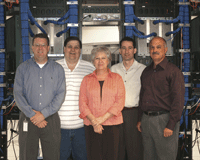 Terry Madden, Robin Greenhagen, Lois Greenhagen, Mark Hotalling and Kelly Kephart of GreenSoft Solutions, Inc.
Terry Madden, Robin Greenhagen, Lois Greenhagen, Mark Hotalling and Kelly Kephart of GreenSoft Solutions, Inc. This is pressure: GreenSoft Solutions was hired to test Burger King’s Whopperettes.com website—a promotion that was going to be launched during this year’s Super Bowl. No one at the company had written or installed the application. As staff members tested the site, they realized that the website wasn’t going to be able to handle the amount of traffic that was projected during the Super Bowl. The developers of the website were unable to fix the problem. Only a few days remained until game time.
This is performing under pressure: GreenSoft Solutions identified the problem and rewrote the code for the Burger King site, all in time for kickoff.
For the past 10 years, GSI has offered hosting, application services, workplace operations, regulatory compliance and data security management—essentially GSI manages the information technology of other businesses. What separates GSI from other companies is an ongoing willingness to adapt to client needs. When Robin Greenhagen started the company in Lawrence, the initial vision was to develop software and to offer consulting for web-enabled companies. Before long, clients wanted GSI to support and host the applications.
Although keeping clients happy is a full-time job, GSI encourages employees to volunteer, offering flexible scheduling as well as paid time off. The company also supports a matching gift program.
Now located in the Crossroads district, GSI employs more than 50 people, including database architects, graphic designers and application developers. According to the company, the fact that GSI has such in-house breadth and depth comforts clients. Those clients include such global brands as Wal-Mart, Microsoft and McGraw Hill as well as a number of local start-ups. With a 525 percent increase in total equity and a 63 percent increase in revenue, it’s apparent that clients large and small are satisfied.
Inergy
The Energy of Inergy
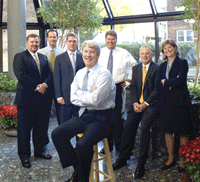 (l to r): David Dehaemers, Brooks Sherman, Andy Atterbury, John Sherman, Phil Elbert, Carl Hughes and Laura Ozenberger of Inergy.
(l to r): David Dehaemers, Brooks Sherman, Andy Atterbury, John Sherman, Phil Elbert, Carl Hughes and Laura Ozenberger of Inergy. Although Inergy’s business is all about propane, Inergy’s business model isn’t. In fact, it isn’t far from the truth to say that the company’s business model has more to do with demographics than energy.
Propane industry veteran John Sherman, now Inergy’s CEO, recognized that a) the propane industry is fragmented and b) the leaders of those individual companies are either at or approaching retirement age. Add “a” and “b” and presto—a business opportunity to provide a succession plan to individual business owners while consolidating operations in experienced hands.
The company says its business model is built on marketing the company itself to successful propane industry entrepreneurs. By hiring industry veterans, leveraging established relationships and joining with the right business partners, Inergy has taken off from a standing start in 1996 to running with revenues of more than $1 billion and a combined market capitalization in excess of $2.3 billion.
Inergy’s sunny financial forecast also brightens the outlook of the region’s non-profit organizations. By actively supporting the efforts of employees, Inergy has assisted the Gillis Center, the Multiple Sclerosis Society, the Alzheimer’s Association, the Susan G. Komen Foundation, the Juvenile Diabetes Research Foundation and the Brain Injury Association as well as other local charities.
But the company hasn’t even hit its financial stride. Consider that it has acquired more than 50 respected propane operations and now serves more than 700,000 retail customers from more than 300 service centers in 30 states. Now consider there are more than 5,000 such independent owners in the appropriate age range.
In addition to its core business, Inergy has established an industry-leading Wholesale, Supply Logistics and Transportation division; acquired a high-performance natural gas storage operation as well as a natural gas liquids operation; and launched a second Master Limited Partnership entity. It was the first general partner to complete a public offering of its equity as an MLP.
Most likely that’s not the last first we’ll see from Inergy.
Perceptive Software
Developing Smart Software
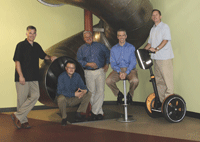 (l to r): Brent Flanders, Cary DeCamp, Tim Helton, Patrick Kearney and Scott Coons of Perceptive Software.
(l to r): Brent Flanders, Cary DeCamp, Tim Helton, Patrick Kearney and Scott Coons of Perceptive Software. Perceptive Software, which Ingram’s named one of KC’s Coolest Companies in June, 2005 now has an impressively cool title—Computerworld Honors Laureate. The award has been presented each year for nearly 20 years to those individuals and organizations that have used information technology to benefit society.
The company received the honor for developing integrated document management, imaging and workflow software that delivers secure, digital version of paper and other electronic documents. So, what does that really mean? ImageNow®, the company’s flagship product, lets users in any industry capture and organize more than 200 different types of documents, then retrieve a single page with a single click from within any other business application.
Any industry? Try healthcare, retail, higher education and financial services, just to name a few. Those 200 different types of documents? Anything from checks to invoices and from applications to contracts. Any other business application? Any manufacturer or platform, across all industries. A single page with a single click? The employees of client companies are able to answer customer service questions faster, pay invoices quicker and keep confidential information safer.
That innovative approach to paper-pushing has paid off. More than 50,000 people in 22 countries use its software. It has posted a double-digit, pretax profit in each fiscal year since 1998. Revenues between 2004 and 2005 increased 44 percent. The company’s compound annual growth rate averaged 47.6 percent over the past five years. And since starting in 1988, Perceptive Software has grown to employ more than 280, maintaining a remarkable 98 percent retention rate.
The company supports an eclectic mix of community causes, philanthropies and programs, based on the interests of those 280 employees. Like most companies, Perceptive Software might give in-kind donations, time off or money. Unlike most companies, Perceptive Software sponsored a 50-team corporate dodgeball tournament on its in-house, National Amateur Dodgeball Association–approved, dodgeball court. “Dodge for a Cause” raised more than $10,000 to benefit the Juvenile Diabetes Research Foundation.
Sisters of Charity of Leavenworth Health System
High Tech Meets High Touch
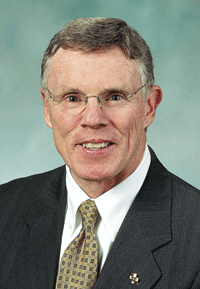 William M. Murray of Sisters of Charity of Leavenworth Health System.
William M. Murray of Sisters of Charity of Leavenworth Health System. Innovation connects with individual care through the Sisters of Charity of Leavenworth Health System (SCLHS), which runs nine hospitals and four stand-alone clinics for the underserved in California, Colorado, Kansas and Montana, operates 2,000 licensed beds and employs more than 11,000.
The health system, dedicated to providing healthcare to the underserved, is implementing a new, $105 million electronic health record technology. Many of the individual hospitals offer advanced laparoscopic surgery, out-patient stereotactic radio surgery to treat brain tumors and a minimally invasive radiation treatment to treat breast cancer.
Of course, high-tech innovation and high-touch individual care must balance because healthcare professionals treat people, not simply diseases. And with a non-profit organization, innovation and individual attention would mean nothing without wise management.
CEO William Murray brings the entire package together, offering patients and their families the benefits of the latest treatment and technology in up-to-date facilities—all while providing a total community benefit of $85.2 million through the hospitals and health system. This cost includes programs such as providing free transportation to treatments for cancer patients, free home visits for obstetrics patients, health education and screenings and many other programs.
Illustrating the fact that giving makes the heart grow even larger, the system office and hospitals provided direct financial contributions of more than $430,000 to Hurricane Katrina relief efforts. Hospitals also donated needed medical supplies. And a rapid response team of patient care staff from several hospitals rotated through a small community hospital in Mississippi for several weeks, meeting medical needs and providing relief for staff members.
Whether through innovation, involvement in the community or successful financial performance, the Sisters of Charity of Leavenworth Health System is directed toward fulfilling its mission of “revealing God’s healing love by improving the health of the individuals and communities we serve, especially those who are poor or vulnerable.”
Shafer, Kline & Warren
Engineering Communities
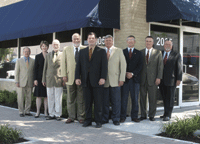 (l to r): Jon Boren, Janet Jakobe-Gray, Larry Graham, Thomas Smith, Ronald Petering, Charles Tulloch, Gerald Johnson, Larry Schall and Allan Cooksey of Shafer, Kline & Warren.
(l to r): Jon Boren, Janet Jakobe-Gray, Larry Graham, Thomas Smith, Ronald Petering, Charles Tulloch, Gerald Johnson, Larry Schall and Allan Cooksey of Shafer, Kline & Warren. At 56, Shafer, Kline & Warren remains focused on the future.
But focusing on the future often requires a good deal of looking backward for this consulting firm. As a leader in the surveying field, the firm holds records from the city that date back more than 100 years, ensuring clients have the most accurate survey information possible to use in future planning and design.
Now, the firm is the first in the region to offer high-definition surveying, which uses laser scanning to deliver digital models and as-built drawings based on electronic measurements. This offers three huge advantages over traditional methods:
- high-density images, combined with color effects and 3D visuals, resulting in much more detail and accuracy;
- difficult or dangerous surveys, such as busy intersections, are much safer and more convenient to conduct;
- historical buildings, which were in remote areas or for which no drawings exist, can now be easily surveyed.
The firm, which also offers engineering, landscape architecture and planning, essentially offers services to build communities, particularly those parts of communities that residents rarely see but often use—such as streets, bridges, utility lines or water pipes. Such community-building pays steady financial dividends, growing solidly over time.
Employees often employ their skills to build area non-profit communities, including the City Union Mission, Harvesters-the Community Food Network and the Heart of America Council of the Boy Scouts of America. SKW also encourages its employees to visit classrooms to educate kids about careers in engineering, math and science.
With offices in Kansas City, Overland Park, Columbia, Chillicothe, North Kansas City, Macon, Mo., and Iola, Kansas, Shafer, Kline & Warren is responsible for building the future of many communities.
The Roasterie
The Business of Beans
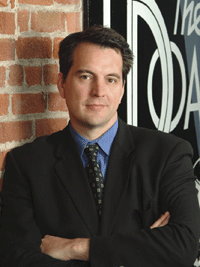 Danny O'Neill.
Danny O'Neill. If you attend a non-profit event in Kansas City, chances are you’ll sip coffee donated by The Roasterie, which supports a venti list of area fundraisers and community functions. The company also filled more than 600 requests last year alone for gift boxes, gift cards and other donated products.
This doesn’t include the good works done by The Roasterie’s St. Drogo Foundation. St. Drogo is the patron saint of coffee; his namesake foundation is dedicated to helping the people in the communities growing The Roasterie’s coffee beans. A percentage of the purchase price of every pound of coffee percolates back through the specific community that farms the beans. With sweat equity and The Roasterie’s help, a Brazilian community built a much-needed preschool, a Costa Rican town built two preschools and a Colombian group is constructing a community center.
The company is doing well as well as doing good. The bean counters report a 400 percent increase in net income between 2004 and 2005, with total equity increasing by 100 percent. The Roasterie’s customer base has also increased far beyond the Kansas City region. In fact, 85 percent of The Roasterie’s online business comes from outside Missouri and Kansas. The company credits its legendary commitment to quality as the factor that pleases these coffee aficionados, a notoriously finicky group.
In addition, the company has added a shot of innovative marketing to caffeinate sales. The Roasterie Café, in Brookside, hosts educational classes, a Coffee Club and a Tasting Club. It also offers free wifi, dog treats, dog hookups and a comfortable ambience. The Roasterie’s version of the Oscar Mayer Weinermobile (may we suggest naming it “Beanermobile?”) cruises the streets of KC, promoting the product at tradeshows, grocery stores and area festivals. The company’s distinct, retro design also perks up sales, creating a consistent look and feel to back up the brand.
With new products, fresh initiatives and imaginative marketing, it’s certain The Roasterie will never be part of the corporate grind.
